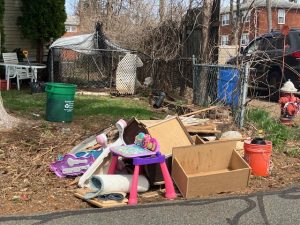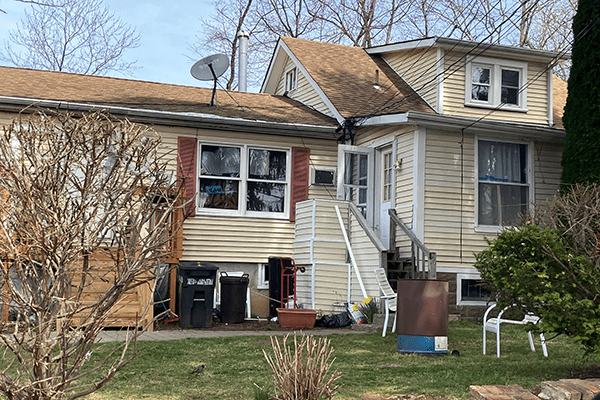|
RCBJ-Audible (Listen For Free)
|
Court Orders & Stipulations Don’t Deter Investor Landlords From Illegal Occupancy Of Single Family Homes
By Tina Traster
For the past few years, a homeowner on Cooper Drive in Nanuet has been struggling with the Sisyphean task of getting the Town of Clarkstown to require a neighbor to convert his property from an illegal boarding house back to a single-family home.
“Most days there are 12 cars in the driveway, trailers on the lawn, landscaping trucks, people coming and going, loud music, explosive garbage piles, constant disturbances,” said a neighbor of 14 Cooper Drive, requesting to remain anonymous. “The house has three entrances. It’s obvious that the house is not inhabited by a single-family.”
Clarkstown is grappling with a slew of instances in which investor-landlords rent homes to home improvement contractors who fill the houses with workers, or illegal immigrants. The town’s code enforcement officer is charged with investigating neighbors’ complaints and bringing the cases to court.
 In Clarkstown, a landlord is out of compliance if the single-family house is occupied by unrelated people. In many of the most egregious cases, it doesn’t require excessive sleuthing to deduce that a single-family house has been converted to a boarding or “multi-family” house. The code enforcement officer’s easiest target is when a house has been carved up, and there is more than one kitchen. However, a dozen mattresses strewn across floors or a parade of cars coming and going day and night or mounds of garbage on pick-up day, is equally compelling evidence laws are being violated.
In Clarkstown, a landlord is out of compliance if the single-family house is occupied by unrelated people. In many of the most egregious cases, it doesn’t require excessive sleuthing to deduce that a single-family house has been converted to a boarding or “multi-family” house. The code enforcement officer’s easiest target is when a house has been carved up, and there is more than one kitchen. However, a dozen mattresses strewn across floors or a parade of cars coming and going day and night or mounds of garbage on pick-up day, is equally compelling evidence laws are being violated.
Last June, Clarkstown Supervisor George Hoehmann, flanked by County Executive Ed Day and Congressman Mike Lawler, held a press conference to announce a crackdown on two landlords who were renting single-family houses in deplorable conditions to people who were clearly not family members. The two landlords, Simcha Schwartz and William Bermeo, owned 17 houses, all illegally rented according to the Town, in deplorable condition with multiple building and fire code violations.
At the press conference, Hoehmann announced the town had filed complaints in Rockland County Supreme Court to seek emergency relief against the owners, asking for immediate access, a restraining order against further occupancy, the forced relocation of the tenants, and money damages, including punitive damages.
“This will not be tolerated in Clarkstown … We’re going to seek every avenue possible to punish these violators,” he told the media.
But in December 2024, the town struck a deal with both Schwartz and Bermeo. Neither landlord had to pay a fine, but both were ordered to permanently refrain from “using, maintaining, allowing, permitting or otherwise acquiescing in the use and occupancy” of the houses cited in the legal proceedings, to be used as anything other than a single-family residence. Under these agreements, the property owners were barred from using the house as a multi-family dwelling or a dormitory/boarding house.
The Stipulation and Consent Order also gave the town the right to inspect the houses at any time for compliance.
“It’s really not fair,” said a neighbor. “All we want to have peace when we are in our homes. It’s clear that Clarkstown is not cracking down on this problem. I don’t see how landlords like this get away without any monetary punishment.”
RCBJ reached out to Schwartz’s attorney Joseph Churgin, but did not get a response.
Neighbors who live near illegally converted houses are at the mercy of Clarkstown’s code enforcement officers. There is little a neighbor can do to cure the problem himself, but residents can be the greatest asset to code enforcement officers. They are the eyes and ears, they have a front row seat, they know what’s going on, and they have the most to lose. When a house is converted to a boarding house, you lose a sense of continuity, safety, stability, on your street. Inevitably it will impact a neighborhood’s quality of life and home prices – when it becomes common knowledge that this kind of abuse is tolerated or goes unprosecuted by a town.
Or if the prosecution and punishment are inadequate.
Part of the problem is that many landlords see court dates and fines as the price of doing business. Months pass before the code enforcement officer gathers enough evidence to seek a warrant to inspect the premises. Then the glacial court proceedings begin, while judges and the town’s attorneys give landlords a long leash to sort out agreements. Cases can stretch for years before the landlord is brought to justice — if ever.
Advocates for relief say Clarkstown and other towns must become more proactive by enlarging code enforcement staffs, securing search warrants as expeditiously as possible, engaging the community to participate in neighborhood watches, enforce violations of rental registries, involve police detectives when possible, take cases to court to exact fines and compensation, use the Court’s contempt powers to fine or jail recalcitrant landlords, and use the town’s bully pulpit to telegraph that these conversions will not be tolerated. However, the last goal is only effective if the town has an actual record of cracking down – one that follows from indictments to the restoration of boarding houses back to a single-family homes.
In both Schwartz’s and Bermeo’s cases, no fines were imposed, nor were the landlords subject to compensatory or punitive damages.
Neighbor of 14 Cooper Drive say the code enforcement officer has not been communicative.
More recently, a neighbor reached out to Clarkstown’s town attorney saying, “I am aware of the Court Order of December 20th regarding 14 Cooper Drive in Nanuet, and the owner’s agreement to be enjoined from any use of the house other than single-family use. The Order has not stopped the boarding house situation at 14 Cooper Drive, which persists to date. Please advise as to what the Town will do regarding enforcing the court order, as well as when the Town will take action.”
In response, the town attorney said, “I have forwarded your message to the code enforcement officer to investigate same.”
RCBJ sought comment from the Town of Clarkstown, but did not receive a response.
In the meantime, at least one of Schwartz’s properties targeted in the enforcement action is under contract to be sold.
Several of the houses in the court cases owned by Schwartz — 4 Fulton Street in Nanuet; 11 Louis Road in New City; 11 Waldron Avenue in Central Nyack; 12 Gillis Avenue in Central Nyack; 14 Albacon Road in Nanuet; 16 Albacon Road in Nanuet; 83 Hall Avenue in New City; and, 116 North Middletown Road in Nanuet – remain in a state of disrepair, with broken doors, garbage piled high on the properties, and multiple cars in the driveways.














